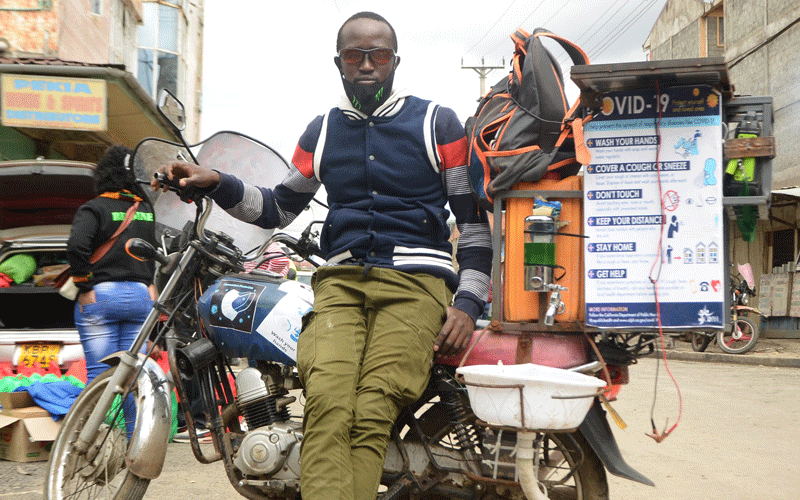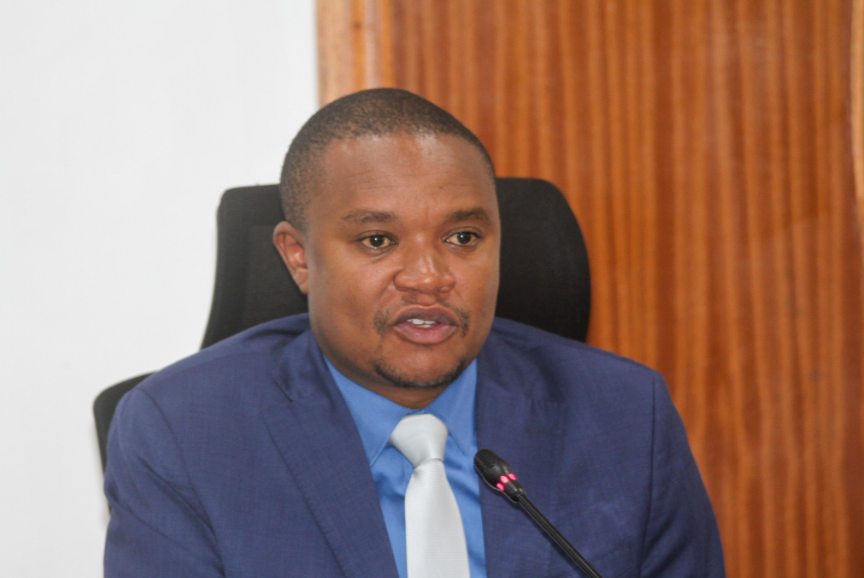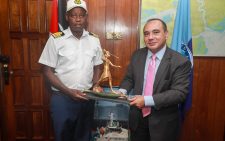Youth takes hand-washing to Majengo’s doorstep

Manuel Ntoyai @manuel_ntoyai
With his commitment to charitable activities, and serving members of his community, Abubakar Marriam saw an opportunity with the onset of Covid-19 in the community.
Born in Majengo informal settlement, Abubakar is an electrical engineer, and he used his engineering skills to address the lack of water in the area, especially following the directive that hand washing is vital in fighting against the coronavirus.
He customised his motorcycle to include a screen and a public address system, which he says is meant to attract people who are naturally wired to respond to such. This would be his mobile hand washing station.
“I started this project when the third case was announced and called it S Covid-19, for Stop Covid-19, because where I come from, there are few hand washing points and people are crowding public places including miraa or muguka chewing base.
Giving back
I saw this as an opportunity to serve my people,” he states. When people come around his mobile station, he talks to them and encourages them to wash their hands.
“I use the opportunity to also ride from one location to another, giving them messages of hope and also more about this pandemic,” says Abubakar.
For the 30-year-old, his passion for lending a hand drove him towards this noble initiative.
“I have this mindset of challenging myself to be a solution provider through my skills and services.
When it comes to helping people, I believe it is a form of giving back and appreciating the Almighty.
I have been involved in charitable events because it is a part of me to see other people happy and I have contributed towards it,” he adds.
His efforts has seen some organisations partner with him, especially when they want to access the informal settlements areas and make public announcements since he is mobile and able to reach places where vehicles can’t.
They use the PA to pass out messages they intend to and also people get a chance to wash their hands.
When the pandemic hit home, there was mass hysteria and misinformation on Covid-19, and this motivated him to change the situation.
At the moment, more organisations have joined the fight by coming on board to help, though there is still a lot to be done.
Balancing his charitable acts and family has also not been an issue for him.
“I have a beautiful family: my wife Ruth Abubakar and two daughters. They have been supportive of this initiative, especially when I felt like quitting, they have been there for me.
My brother Dennis too is part of this,” he says. Besides running the hand washing station, he also supports the vulnerable by providing essential needs.
“I have my normal work, which I do to feed my family. However, during this pandemic I have been using 70 per cent of my income to help those vulnerable by buying them food, soaps and other essentials because most of them are people I grew up with and it’s just unfortunate that they’ve lost their jobs.
Passing skills
The remainder I use it for my family needs. I also make and distribute masks to those around me,” he says.
Abubakar is also putting his engineering skills in building other products and items to help people.
“At my workshop in Gikomba, I made automatic sanitising booths for the public that uses sensors.
I am also working on a mobile maternity clinic, which I believe will help many not just in the slums where such services are needed, but also in the country side,” he states.
For young people unable to continue with their education, he has been training them at his garage, to help pass on the skills so that they too can earn a living in a modest way. He says many of them would normally end up in drug abuse and crime.
“This has been a challenging time for most of young people who have lost their jobs, homes and even loved ones.
However, I would challenge them to be better citizens by standing up to be counted despite the challenges,” he says











